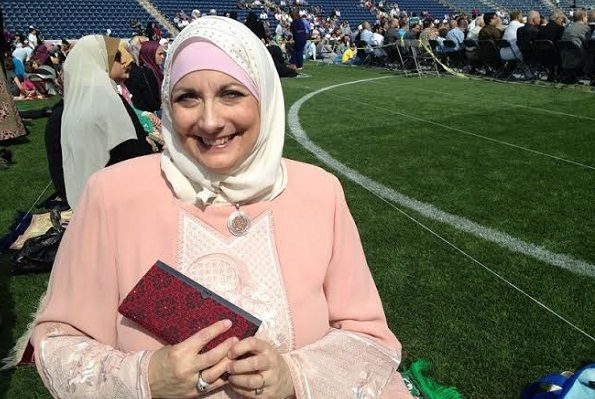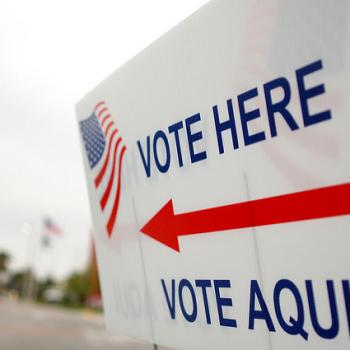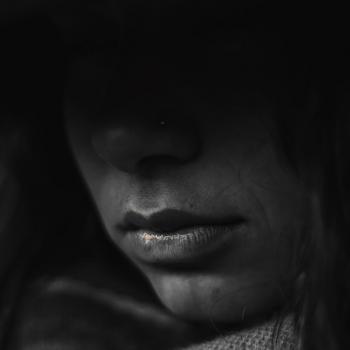
This is Day Seven of the #30Days30Writers 2016 Ramadan series.
By Kristin Szremski
Eventually, I stopped praying.
It happened gradually. First, I’d oversleep Fajr, and then I’d be too tired for Ishaa. Then without notice, my prayers nearly ceased. I became confused. I was lost, and I ushered in a spiritual crisis of my own making. Like John Steinbeck’s character Ethan Hawley in “The Winter of our Discontent,” I grew restless and ungrateful.
I entered the Year of My Discontent.
To paraphrase Steinbeck, when a condition becomes too great to face, we force it inward, where it “minces up with a lot of other things already there and what comes out is discontent and uneasiness, guilt and a compulsion to get something – anything – before it is all gone.”
For me, I was compelled to find someone to blame for my discontent.
**********
Kneeling beside a bed in a hotel room in Washington DC on July 27, 2001, with a Bible and Mushaf open before me, I embraced Islam while praying for guidance.
I was enthralled with my new religion. I loved its perfection. Its clarity. Though I should have known better, I made the mistake of conflating our imams with this perfection. I stopped seeing our leaders as human beings and instead expected them to be perfect envoys for the perfect religion. I lived happily in this delusion for years until it became impossible to ignore their humanity, their mistakes and their frailties. As my rose-colored lenses first cracked and then shattered, I didn’t possess any capacity for understanding or forgiveness.
I blamed them for the rising confusion in my soul.
Then I blamed patriarchy and used it as another excuse to stop praying. I began to consider removing my hijab and leaving the practice of Islam all together. I considered living as a Muslim “in my heart” only.
Next I turned on “the community.” Despite having been not only welcomed but actually embraced by the people of mosques in Illinois, particularly the Mosque Foundation in Bridgeview, IL, which I consider to be my home, I blamed them for letting me down. Ignoring the rich friendships and support I have, I complained about not being invited to enough iftars, of feeling marginalized, immaterial and insignificant. What an affront to all those who have loved and supported me along the way!
Imam Suhaib Webb said that Shaitan (the devil) loves to confuse because in confusion believers fall away from Allah SWT. I allowed confusion to mesh with my internal issues to produce the discontent and guilt that Steinbeck foretold.
**********
Due to childhood trauma, I grew up without a strong sense of my place in this world. I felt guilty for the space I took up on this Earth. That only intensified as a convert. I left behind my family and customs. My traditions were supplanted by Islamic ones, such as Eid, which I usually spend alone.
Loneliness is a convert’s constant companion, and studies show that inherent loneliness is caused by social isolation, by being the “other” even if we’re surrounded by people. Many Muslims feel social isolation because of Islamophobia; for me as a convert it is amplified – I’m not a “born Muslim” and I am estranged from my family.
Instead of confronting my demons from within, I lashed outwardly toward my fellow Muslims. I had given up my one guarantee of connectedness – prayer – and blamed everyone else for my miserable state of discontent.
Then, something merciful happened: I decided to pray in preparation for Ramadan. Exactly when my forehead touched the floor in that first prostration, I knew exactly where and to whom I belonged. I knew I didn’t need external factors to validate who I am as a human being or as a Muslim. I knew I belonged to Allah. The entire Earth is His masjid, and anywhere I prostrate I am His. The sense of “otherness” disappeared. The need to find blame vanished.
I am ecstatic to be here this Ramadan, where I am trying day by day to seek Allah’s mercy and forgiveness. How blessed are we all to be able to increase our faith and work toward Taqwah.
The first 10 days of Ramadan are for mercy. As I seek Allah’s mercy to help me through my crisis and to bring me back to the Rope of Faith, I also ask that He grant all of us mercy to bestow on others. How much stronger we would be as a faith community if we dealt with each other’s shortcomings with mercy, wisdom and forgiveness instead of anger, recriminations and even outright fitna.
Ramadan is indeed the month of mercy. It is also the month of the Quran. This is what protects us from the “winter of our discontent.”
Truly there has come to you from Allah a guiding light and a clear Book in this Quran. By it Allah guides whomever follows His good pleasure along the pathways of peace. And, thereby, He brings them out from the veils of darkness into light – by His permission. Thus does He guide them to a straight way of salvation. Quran 5:15-16.
Allah’s mercy is bringing me out of the darkness of my discontent. This Ramadan, may we all receive His mercy, and may we remember to be merciful to each other. Ramadan Kareem.
Kristin Szremski is an award-winning independent journalist living in Washington DC. She is currently the director of media and communications for the American Muslims for Palestine and is a member of the National Press Club.











